Here's the latest on Covid-19 cases rising in Europe
From CNN's Niamh Kennedy
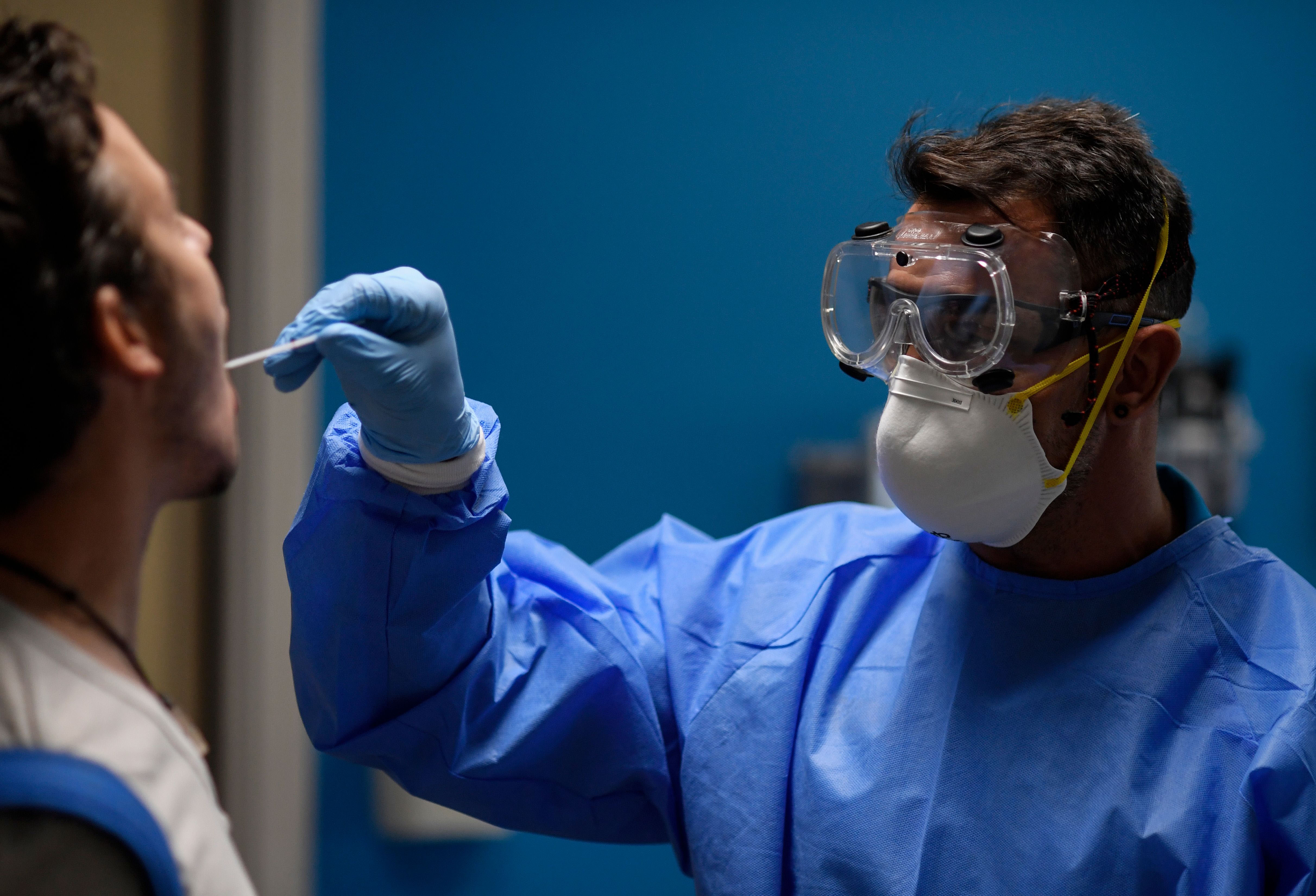 A health care worker in Madrid collects a swab sample at a Covid-19 testing center on August 17. Oscar Del Pozo/AFP/Getty Images
A health care worker in Madrid collects a swab sample at a Covid-19 testing center on August 17. Oscar Del Pozo/AFP/Getty ImagesAs governments in Europe battle to control further waves of the coronavirus pandemic, Covid-19 cases are increasing across the continent, as students are returning to school. Here are the latest developments:
Germany continues to grapple with a steady rise in infections, with 711 new cases reported on Monday, according to the Robert-Koch-Institute. This comes after a dramatic increase of 2,034 cases on Saturday, the highest number of infections in the country since April 26. Germany had its infection peak in early April when cases hovered around 6,000 every day. The return of schools and holidaymakers from European travels has played a role in the recent resurgence of cases.
The UK recorded a further 1,041 new cases on Sunday as its schools prepare to reopen. However, the chief medical officers and deputy chief medical officers of its four nations said they are "confident that there is clear evidence of a very low rate of severe disease in children of primary and secondary school ages compared to adults" in a Sunday statement. It added that teachers are not at an increased risk of dying from Covid-19 compared to the general working-age population, but did recognize that it "is likely opening schools will put some upward pressure on transmission more widely and therefore increase [the] R [reproduction rate]."
France reported its highest increase in case numbers since exiting lockdown, with 4,897 new cases reported Sunday by national health agency Santé Publique France. This takes the total number of cases to 242,899. There are currently 59.8 cases per 100,000 residents, according to the European Center for Disease Prevention and Control (ECDC). Despite the impact on the country's health system being "very limited," the numbers of patients in hospital, particularly in intensive care, is beginning to rise, tweeted Health Minister Olivier Véran on Sunday. Véran urged French citizens to "break this dynamic" as French schools gear up for students to return.
Belgium was one of the first countries to be hit by a new wave in cases and it drastically tightened social distancing measures on July 27. Belgians will have to continue restricting their social bubble to five people for a further month so that schools can return safely, according to a Thursday press release from the country's National Security Council. The measures appear to be paying off with the average number of daily cases lower than the previous week. Last week there were an average of 493 daily cases compared to a daily average of 581 the previous week, according to figures from the country's epidemiological institute Sciensano published Monday.
Ireland continues to deal with the fallout from a political scandal which saw the EU Commissioner for Trade, a Supreme Court judge and a government minister attend a golf event in violation of the country’s coronavirus social distancing rules, which restrict gatherings of more than 50 people. The country recorded 156 new cases on Saturday and 61 more on Sunday, according to the Department of Health, after significantly tightening up social distancing. Under new measures Irish citizens cannot gather in groups larger than six people indoors and 15 people outdoors.
Italy recorded another 1,210 cases Sunday, the highest number of new cases since May 12, in addition to 1,071 cases on Saturday. Health officials say the increase in cases is due to large numbers of Italians returning from overseas. The Lazio region, which is home to the country's capital Rome, recorded 215 new cases Saturday, 61% of which were found to be linked to the tourism hotspot of Sardinia. Regional health assessor Alessio D'Amato said Saturday that while “hospitals and intensive care units are under control,” young people in Italy must not assume they are "invincible" to the virus.
Croatia's case numbers continue to increase after the country was removed from the UK's quarantine exemption list Thursday. There were 171 new cases reported Monday morning, according to the ECDC, which said the country has a rate of 57.8 cases per 100,000 persons.
Spain saw 8,148 new cases recorded in the 24 hours leading up to Friday, according to the country's Ministry of Health, one of the highest daily increases since lockdown measures were eased at the end of June. Spain currently has the highest infection rate of any country in Europe, according to the ECDC, with a 14-day cumulative number of cases of 152.7 per 100,000 people. The government will release the latest data on Monday.
China has been giving homegrown vaccine to "high risk" professionals since July
From CNN's Amy Woodyatt
China has been using an experimental coronavirus vaccine on people who work in "high risk" professions since July, including front line medical professionals and border inspectors, a senior official from the national health commission revealed over the weekend.
Zheng Zhongwei, director of the Science and Technology Development Center of the National Health Commission, said the vaccine had been approved for use on July 22 during an interview with a Chinese state media broadcaster on Saturday.
Zheng told the CCTV-2 program "Dialogue" that the people who were at high risk of exposure to the virus -- including frontline medical personnel, epidemic prevention personnel, medical staff at fever clinics, and customs and border personnel -- were eligible to receive the vaccine.
The vaccine was developed by Sinopharm's China National Biotec Group Company (CNBG). Phase 3 clinical trials of this vaccine have been conducted in the UAE, Peru, Morocco, and Argentina.
Mexico goes back to (virtual) school
From CNN's Matt Rivers
More than 30 million students return to school in Mexico today. They will not be returning to the classroom, however, after the Mexican government announced earlier this month that all classes will be virtual. Nearly half of the country's homes don't have internet connection but about 93% have televisions, so the government has launched an ambitious plan to record lessons for every single grade level and broadcast educational content 24/7.
WATCH:
It's more important than ever to get a flu shot, say public health experts
From Julie Appleby and Michelle Andrews, Kaiser Health News
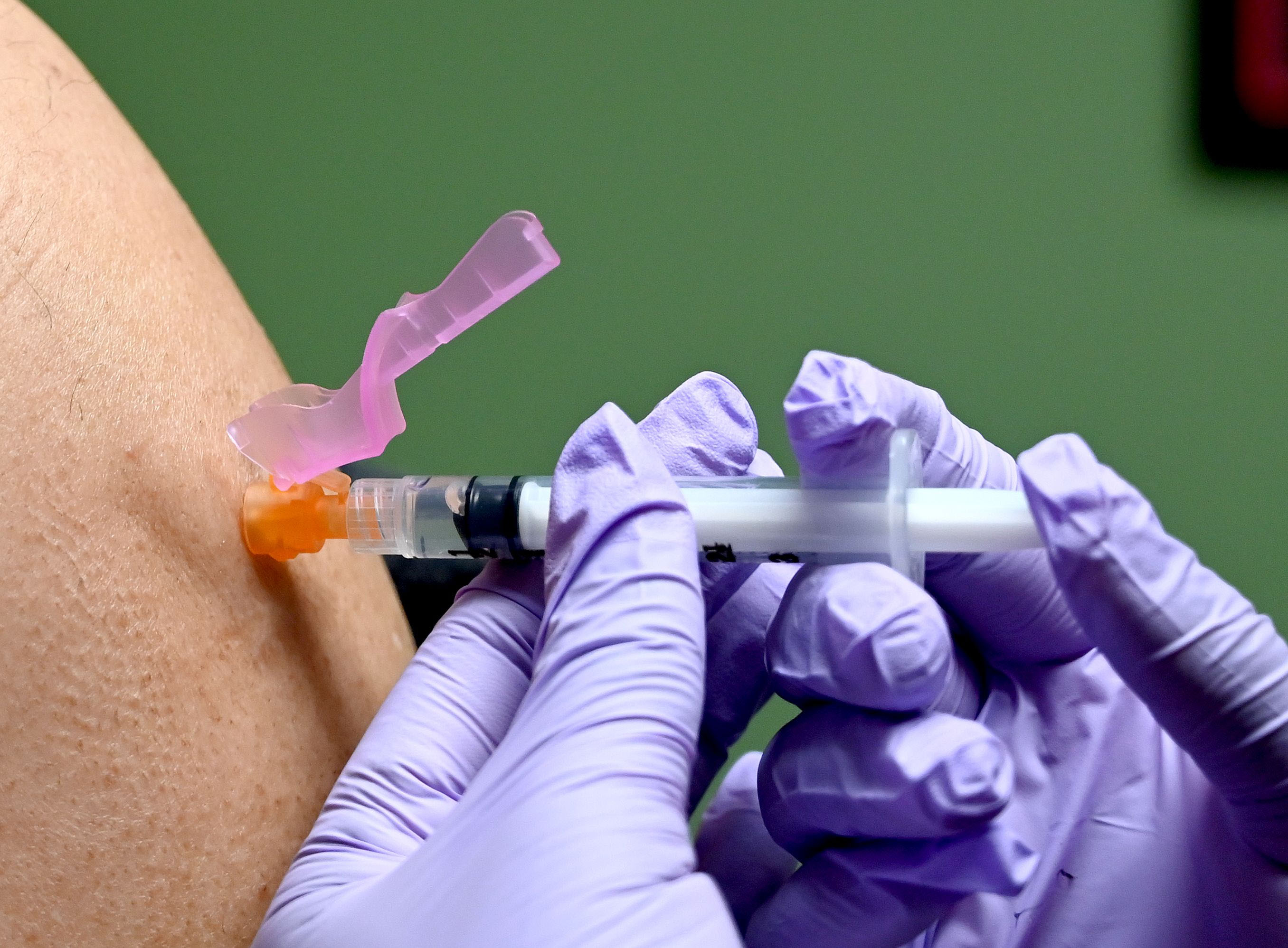 A person gets a flu shot at a health facility in Washington, DC, on January 31. Eva Hambach/AFP/Getty Images
A person gets a flu shot at a health facility in Washington, DC, on January 31. Eva Hambach/AFP/Getty ImagesFlu season will look different in the US this year, as the country grapples with a coronavirus pandemic that has already killed more than 176,000 people.
Many Americans are reluctant to visit a doctor's office, and public health officials worry people will shy away from being immunized.
Although sometimes incorrectly regarded as just another bad cold, flu also kills tens of thousands of people in the US each year, with the very young, the elderly and those with underlying conditions the most vulnerable. When coupled with the effects of Covid-19, public health experts say it's more important than ever to get a flu shot.
Getting vaccinated for the flu this year is particularly important, WHO officials say
If enough of the US population gets vaccinated — more than the 45% who did last flu season — it could help head off a nightmare scenario in the coming winter of hospitals stuffed with both Covid-19 patients and those suffering from severe effects of influenza.
Aside from the potential burden on hospitals, there's the possibility people could get both viruses and "no one knows what happens if you get influenza and Covid (simultaneously) because it's never happened before," Dr. Rachel Levine, Pennsylvania's secretary of health, told reporters last week.
India hopes to jumpstart Bollywood with new film production guidance
From Swati Gupta in New Delhi
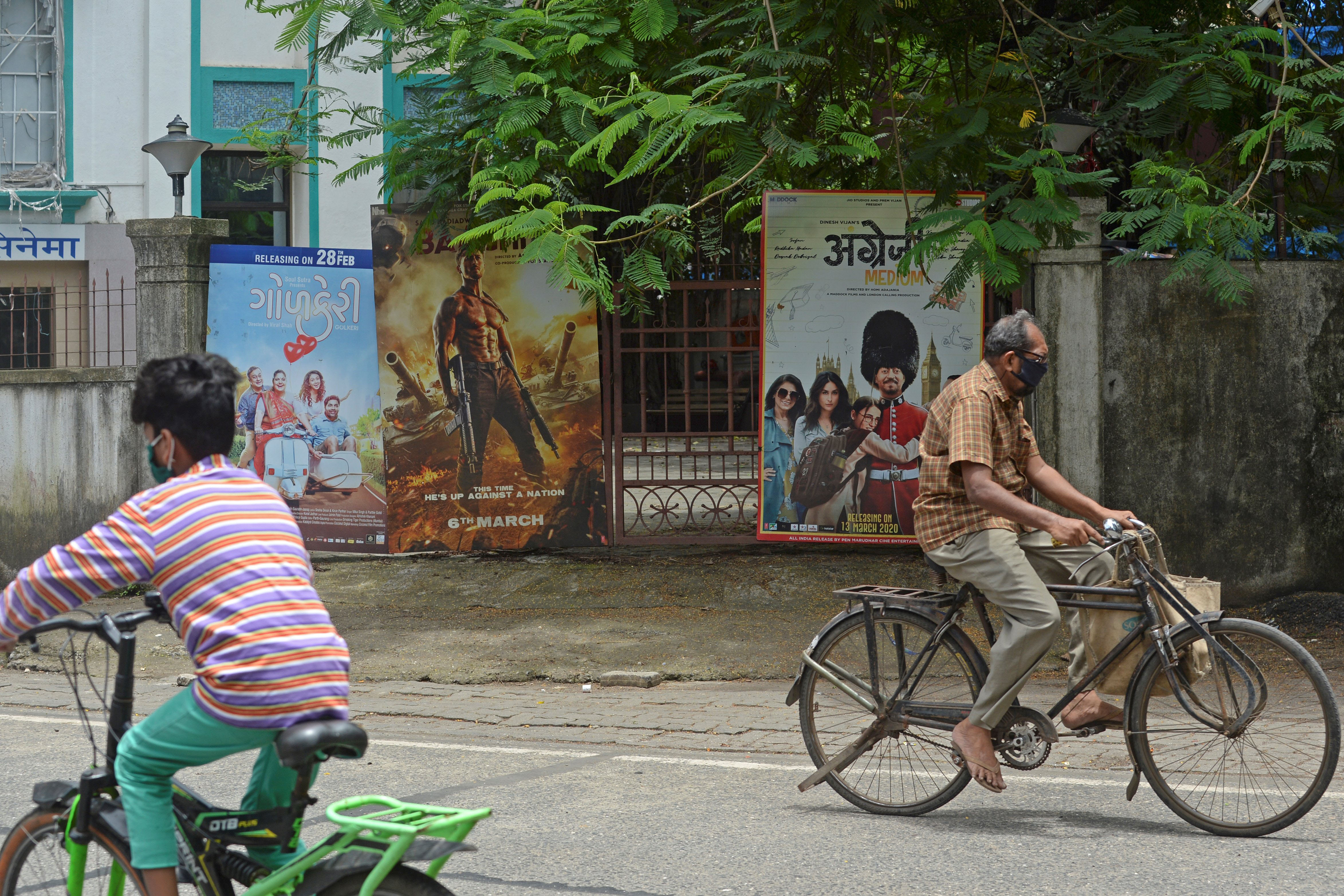 People bike past a closed movie theater in Mumbai, India, on July 21. Indranil Mukherjee/AFP/Getty Images
People bike past a closed movie theater in Mumbai, India, on July 21. Indranil Mukherjee/AFP/Getty ImagesIndia's Ministry of Information and Broadcasting has released fresh guidelines for the entertainment industry after all productions were ended in March due to the pandemic.
The new standard operating procedure (SOP) is expected to ensure the safety of the cast and crew in both television and movie productions, which may resume as India has slowly lifted restrictions over the past three months.
“The SOP ensures adequate distancing at shoot locations and other workplaces and contains measures including proper sanitization, crowd management and provision for protective equipment,” tweeted cabinet minister Prakash Javadekar on Sunday.
Face masks, hand sanitizer, thermal screening and social distancing are among the new measures. Production companies have been asked to keep the cast and crew at a minimum and coordinate crowds that may gather during an outdoor shoot.
“The SOP follows international norms. This will help give a fillip to the industry which has been affected due to coronavirus for close to six months now and people will welcome this move by the Ministry,” said Javadekar.
How much longer until the US economy is back to normal? This index shows there's a long way to go
From Mark Zandi, CNN Business
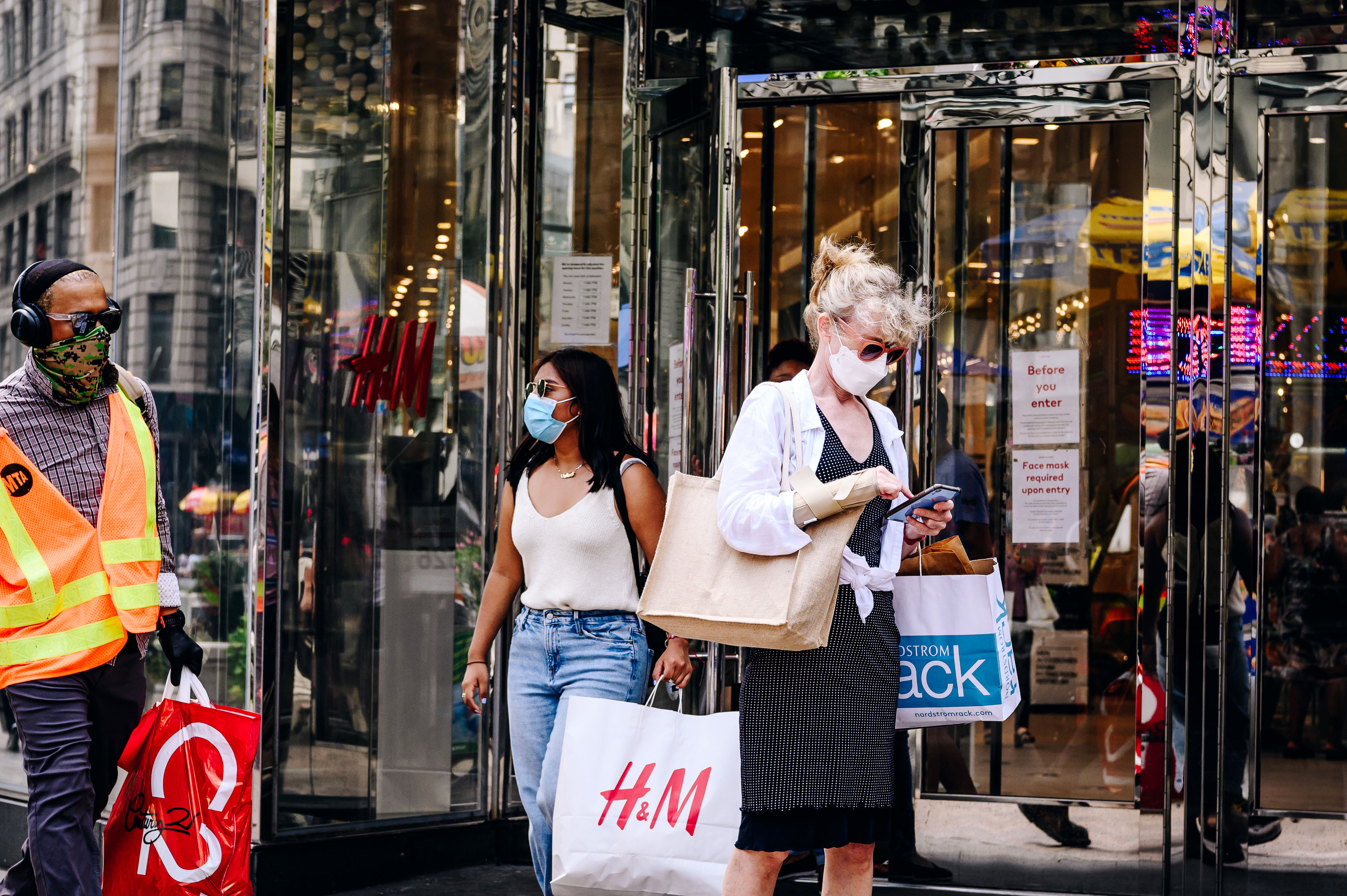 People shop in the Herald Square area of New York City on August 6. Nina Westervelt/Bloomberg/Getty Images
People shop in the Herald Square area of New York City on August 6. Nina Westervelt/Bloomberg/Getty ImagesWe're coming up on six months since Covid-19 turned the world upside down. We are adjusting, but few things feel normal. Certainly not in our daily lives. Most of us are wearing masks and social distancing, while our favorite sports teams play in empty stadiums and arenas. Our work lives are hardly typical, either. Lots of us are unemployed, and many of us fortunate to have jobs continue to work from home.
How far from normal are we? And how much progress are we making toward whatever "normal" will mean in the future? These are tough questions, but CNN Business and Moody's Analytics have teamed up to take a crack at answering them with regard to the economy.
How close to normal is your state? Click here to explore the index
The US economy remains far from normal. That's the bottom line. Based on the Back-to-Normal Index that we constructed, the US economy was operating at only 78% of normal as of August 19. "Normal" for our purpose is the economy as it stood prior to when the pandemic struck in early March. Economic activity nationwide is down by almost one-fourth from its pre-pandemic level — far from normal.
As bad as that is, it is substantially better than the darkest days of the pandemic in mid-April, when we were unsure how contagious or virulent the virus was. Nonessential businesses in much of the country were shut down, and most of us were sheltering in place. Our Back-to-Normal index hit its nadir of just 59% on April 17.
South Korea stops in-person classes at almost 2,000 schools
From CNN's Yoonjung Seo in Seoul
Almost 2,000 schools in South Korea have suspended in-person classes due to the latest surge of coronavirus cases, according to a statement from the country’s Ministry of Education on Monday.
The announcement affects 1,845 schools across the nation, the first time since May that more than 1,000 schools will be closed, said the ministry.
A total of 283 students and 79 faculty members have tested positive for novel coronavirus since May 20 when South Korea began a phased return of pupils to the classroom, according to the ministry.
Countries around the world are currently grappling with how to keep children learning during the pandemic.
The world is facing a "generational catastrophe" because of school closures during the coronavirus pandemic, UN Secretary-General Antonio Guterres warned at the beginning of August.
"Getting students back into schools and learning institutions as safely as possible must be a top priority," once local transmission of Covid-19 is under control, Guterres added.
Disaster looms for Boris Johnson as fall crises collide
From CNN's Luke McGee
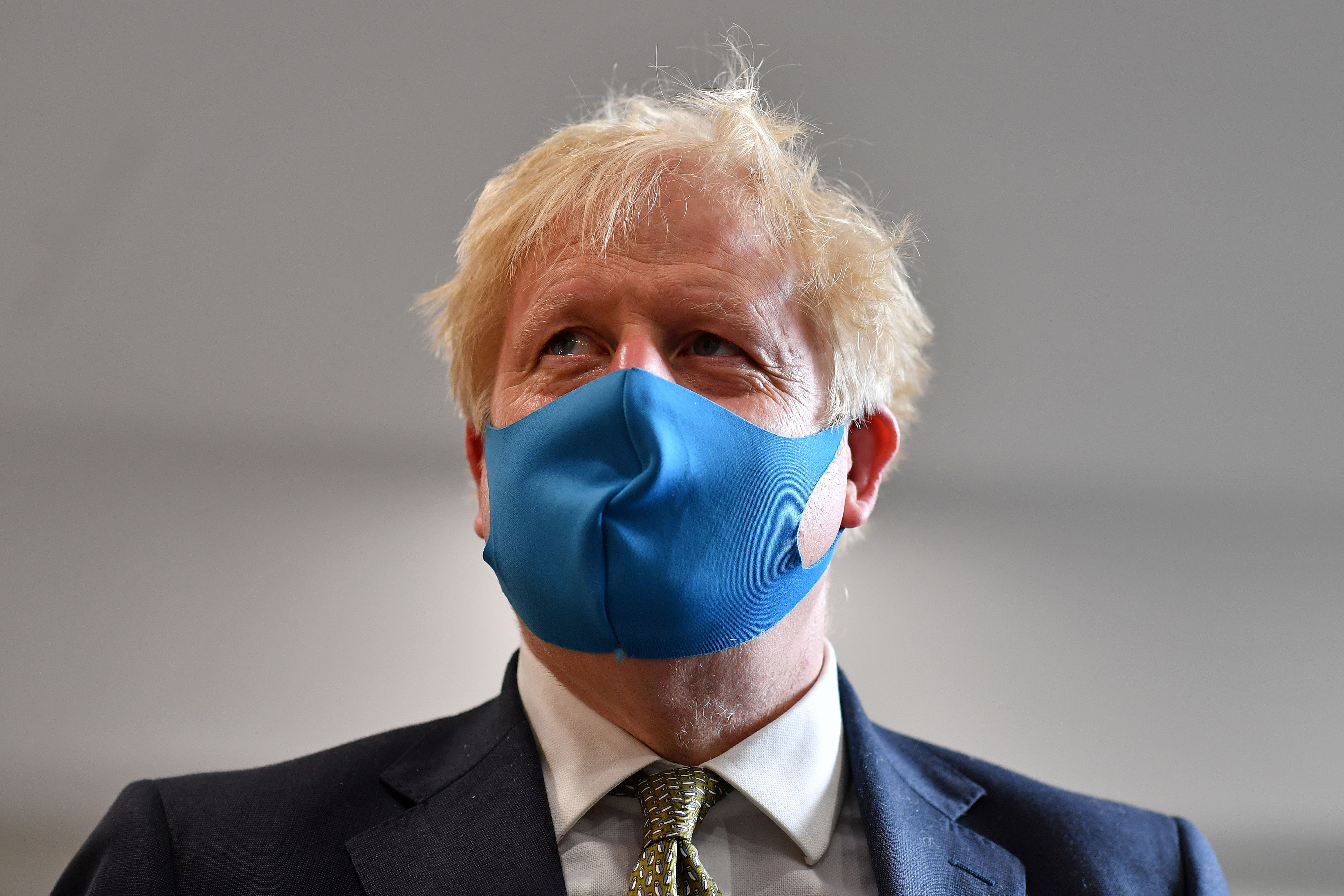 UK Prime Minister Boris Johnson visits the headquarters of the London Ambulance Service NHS Trust on July 13. Ben Stansall/WPA Pool/Getty Images
UK Prime Minister Boris Johnson visits the headquarters of the London Ambulance Service NHS Trust on July 13. Ben Stansall/WPA Pool/Getty ImagesEven by the standards of a world leader navigating a pandemic, Boris Johnson has had a tumultuous 2020. The UK's Prime Minister returns to work on Monday, having spent a week on vacation with his fiancée and baby in Scotland. In that time he'll have had the chance to reflect on his extraordinary year to date, in which he took his country out of the European Union, got divorced, got engaged, got Covid-19 so badly he was taken to intensive care, had a baby and endured months of criticism over his handling of coronavirus.
The main charge is that Johnson's government took too long to take the virus seriously, meaning it had an inadequate testing regime, locked down too late and obsessively tried to handle the crisis from London. The result is that the UK has suffered the most deaths in Europe and the fifth most in the world, according to Johns Hopkins University.
During the crisis, Johnson's government has suffered multiple embarrassing scandals -- from his chief adviser being accused of breaking lockdown rules to a messy U-turn after nationwide confusion over schoolchildren's exam results led to protests in London.
Unfortunately for Johnson, life is unlikely to be much easier this fall. After an eventful summer, UK lawmakers return to parliament on September 1, giving Johnson's opponents in the Labour Party -- newly invigorated under the leadership of Keir Starmer -- a forum to hold him to account as numerous crises run into each other between now and the end of the year.
South Korean President warns that country is facing a virus crisis worse than the first wave
From CNN's Jake Kwon in Seoul
 South Korea's President Moon Jae-in speaks at an event in Seoul on August 15. Chung Sung-Jun/Getty Images
South Korea's President Moon Jae-in speaks at an event in Seoul on August 15. Chung Sung-Jun/Getty ImagesSouth Korea's President Moon said that the country is facing a new virus crisis and that it is much more severe than dealing with the controversial church cluster in its first wave.
“We are facing a new crisis. It's a much more severe emergency than the Shincheonji situation in the early days of the Covid-19 crisis," said Moon.
"Seoul and the metropolitan area have become the centers of spread, and nowhere else in the country is safe."
If health officials were unable to curb the spread of the virus then the social distancing level will be raised to Alert Level 3 which would mean "daily life will be stopped, jobs will be collapsed and a huge economic blow should be endured," warned Moon.
"Even the medical system could collapse," the President said in a meeting with senior advisors in Seoul on Monday.
Moon said that the effort to stem the spread of the virus in South Korea is being hampered because "some in our society are challenging the nation's disease prevention system and blatantly obstructing or refusing to cooperate the health effort."
The latest outbreak in South Korea has been linked to churches in Seoul and the neighboring provinces. Members of religious groups have been criticized for withholding key information and obstructing public health authorities in their fight against the pandemic.
"We cannot tolerate individual transgressions such as non-cooperation in disease prevention or quarantine violation by refusing administrative orders. The damage to people is already too great. It has hurt the lives and health of many people, stopped their daily lives, and hurt the economy and employment," Moon told his senior advisors.

 5 years ago
551
5 years ago
551 

